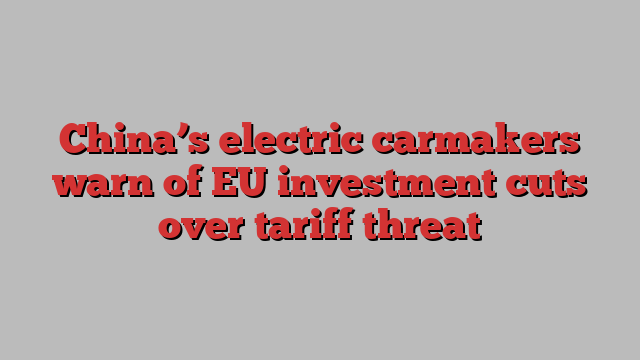
Unlock the Editor’s Digest for free
Roula Khalaf, Editor of the FT, selects her favourite stories in this weekly newsletter.
Chinese car companies have warned that they will reduce investment in the EU if it imposes tariffs on electric vehicle imports next month.
“Certain Chinese companies noted that if the EU proceeds with the imposition of additional tariffs, their existing investment plans would have to be re-evaluated as their confidence in the EU’s investment environment would be diminished,” said the China Chamber of Commerce to the EU after a meeting with Beijing’s commerce minister Wang Wentao in Brussels.
Wang held last-ditch talks on Thursday with European trade commissioner Valdis Dombrovskis in a bid to halt the tariffs. They said they will hold more discussions on the issue.
A European Commission spokesperson said the anti-subsidy investigation would continue and was “based strictly on facts and evidence and is in full compliance with WTO rules and EU law”.
Brussels’ moves to protect local carmakers with higher tariffs comes as their Chinese counterparts gain a bigger share of the Europe EV market and invest heavily in factories, dealers and marketing in the bloc. BYD, the world’s largest EV maker by sales, has one plant in Hungary and is considering building a second.
Chinese EVs are already subject to a 10 per cent tariff, but EU member states will vote soon on whether to approve the additional tariffs, which range up to 35.3 per cent, for five years. The US has said it will quadruple the tariff on Chinese EVs to 100 per cent this year.
Dombrovskis said he would work on a “mutually agreeable solution” and look again at Chinese offers of voluntary price controls, which he had previously rejected.
He also asked Wang to end China’s trade defence investigations against EU imports of brandy, pork and dairy products. Beijing launched the probes, which could lead to tariffs, in response to the EU investigation. Since then Spain, a big pork exporter, has wavered in its support for EV tariffs.
Countries with strong automotive links to China such as Germany, Hungary and Sweden have said they oppose them. German companies BMW and Volkswagen, which have Chinese plants that make models for the EU market, say they will be hit by the tariffs.
Chinese carmakers have invested in plants in Spain, Poland and Hungary and battery producers in Germany and Hungary.
However, it will take 15 of the 27 member states to block the proposals and EU officials are confident the tariffs will be approved.
“If we don’t back tariffs now we might as well give up on standing up to China,” said one EU diplomat.
Wang told the carmakers’ meeting on Wednesday that some countries were “bullying” China, according to the chamber of commerce.
The relationship was at a “crossroads” with one path leading to openness and collaboration while the other to protectionism and isolation, he said.
Their warning came as new registrations for electric vehicles in Europe fell 36 per cent in August from a year ago, marking the biggest monthly drop since early 2017, according to data group Jato Dynamics.
With heavy declines in demand for VW, Renault and Stellantis, owner of the Opel, Peugeot and Chrysler marques, the market share of Chinese carmakers and Chinese-owned brands in EV sales increased to 15.5 per cent in August from 10.5 per cent a year ago.
But Jato global analyst Felipe Munoz said concerns about tariffs were already hitting European consumer demand for Chinese-owned brands, with registration levels for SAIC-owned MG plummeting 65 per cent in August.
“The tariffs and everything around the Chinese EVs that was in the news since July are all having an impact,” he added.